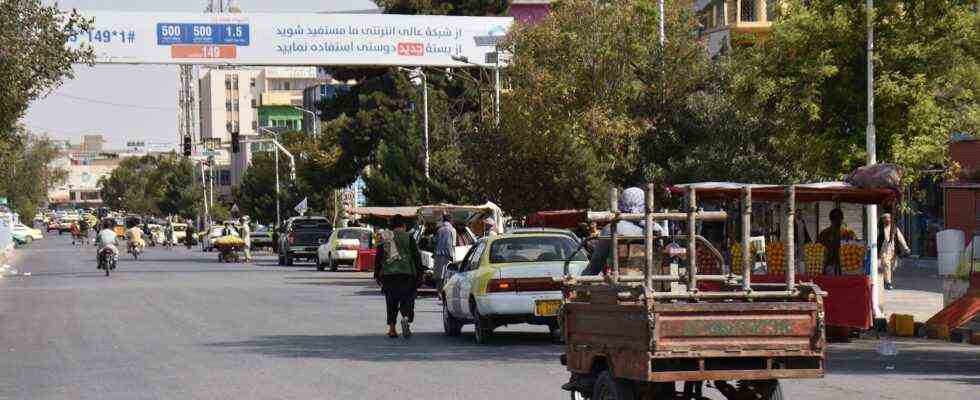Status: 10/27/2021 4:45 a.m.
The Federal Government wants to conduct a comprehensive investigation into how effective the civil aid projects in Afghanistan have been in recent years. This causes irritation for the parties.
The days around Kabul airport were disturbing, and they seemed to mark the failure of German and international Afghanistan policy before the eyes of the world. When the Taliban captured the capital in Kabul in mid-August, when German embassy staff and thousands of Afghan people fled the country in panic, one question seemed obvious: All those years of engagement and civil engagement in Afghanistan – in vain?
More than 1.3 billion euros in costs
The Federal Republic of Germany spent more than 1.3 billion euros on so-called stabilization projects in Afghanistan from 2013 to 2020. This included humanitarian aid, the care of refugees, the promotion of schools and other educational institutions, scholarships as well as the promotion of culture, media and science. Added to this was the development and training of the Afghan police, into which several million euros have also flowed. What has all this civilian engagement achieved in the Hindu Kush?
Cross-departmental evaluation
The federal government wants to have this examined comprehensively – as part of a so-called inter-departmental evaluation. This should include the projects of the Federal Foreign Office, the Federal Ministry of the Interior and the Federal Ministry for Economic Cooperation and Development. A joint working group is to be formed, which will then participate in the preparation of a final report by November 2023 – a major project.
In the documents on the award process it is stated that the aim of such an evaluation is “to carry out an independent and comprehensive analysis and assessment of the civil engagement of the federal government in Afghanistan”.
Criticism at the time of the advertisement
But in the German Bundestag, where many were surprised by the tender, there is now increasing criticism of the project. Because the Federal Foreign Office was put out to tender just one week before the federal election, largely without much publicity – apparently in order to ensure an external investigation of Afghanistan regardless of the outcome of the election.
This is now causing irritation in parliament and raises the question: How exactly will the Afghanistan reconnaissance look like? And how does the ambitious and probably costly evaluation project fit into Parliament’s efforts to educate people?
Because there, too, it is clear: the Afghanistan mission, which is critical in many respects, is about to undergo a general investigation. The exploratory paper of a possible future government coalition of the SPD, the Greens and the FDP has already stated: A parliamentary committee of inquiry in the Bundestag is to examine the events surrounding the military evacuation in Kabul. And a so-called Enquete Commission is also to take a close look at Germany’s Afghanistan policy. Is there an additional need for an expensive tender?
“Wasted money”
“I consider this awarding to external parties a waste of money,” says CDU politician Patrick Sensburg, who was a member of the Bundestag’s council of elders until the end. “In reality, the experts in our ministries know what went wrong in Afghanistan and what worked well. I certainly trust our officials to sit down and formulate it.”
There is also criticism of the award from the ranks of the Greens, who are currently negotiating a new government coalition with the SPD and FDP. According to the Deputy Green Group leader Agnieszka Brugger, the civil, police and military engagement in Afghanistan must be evaluated comprehensively, critically and independently, “but it was not a wise way to do this in the last few days in office without real consultation with the Bundestag to knock out, precisely because a real, well-founded reappraisal requires a large number of actors and, in particular, parliament. “
“Need external expertise”
The attitude of the FDP is different. Its defense policy spokeswoman in the Bundestag, Marie-Agnes Strack-Zimmermann, says: “We need this external expertise, no ifs or buts. But we also need a commission of inquiry, in which the soldiers concerned, members of the Bundestag, internal and external experts sit. “
And so there is now a reappraisal that is probably unprecedented in the Federal Republican history of German missions abroad.
The government wants recommendations for action to be drawn up
In many places it is still unclear how the review of Germany’s Afghanistan policy should actually look like. Only for the Federal Development Ministry has it already been determined who will carry out the evaluation: The German Evaluation Institute for Development Cooperation – in short: Deval – under the direction of Stefan Leiderer.
He rejects criticism of a hasty shot: “The planning for the evaluation project is a long time ahead and has nothing to do with the developments in Kabul in August of this year. We had already proposed in our evaluation program last year that the To evaluate BMZ in Afghanistan in more detail. “
It is now important to him “as far as possible not to duplicate anything, but to work in a complementary manner to other efforts that are now also being made within parliament to come to terms with German commitments in Afghanistan.” The Federal Development Ministry expressed itself on WDR– Inquiry so far not on questions about the evaluation project.
Questions about the process
But questions also arise about the process: Because with whom Deval will ultimately work has not yet been determined: the Europe-wide tender is currently still running for the part for which the Federal Foreign Office is responsible.
What exactly is being evaluated?
Who will be awarded the contract? Open minded. The Federal Ministry of the Interior, also involved, does not even want to tender its evaluation, but apparently independently “awarded within the framework of a subliminal award without a participation competition” as the Foreign Office says. Obviously, what exactly will be evaluated in which way still has to be shown.
In the tender documents, for example, there is talk of a cost-benefit assessment and “concrete recommendations for action” should be described. One of the questions is: “Which lessons learned from the civilian engagement of the Federal Government in Afghanistan can be derived and applied for other engagements in similar crisis situations?” That should also be the question that a study commission in the Bundestag will then investigate.


